The Perfect Roast Beef with Gravy
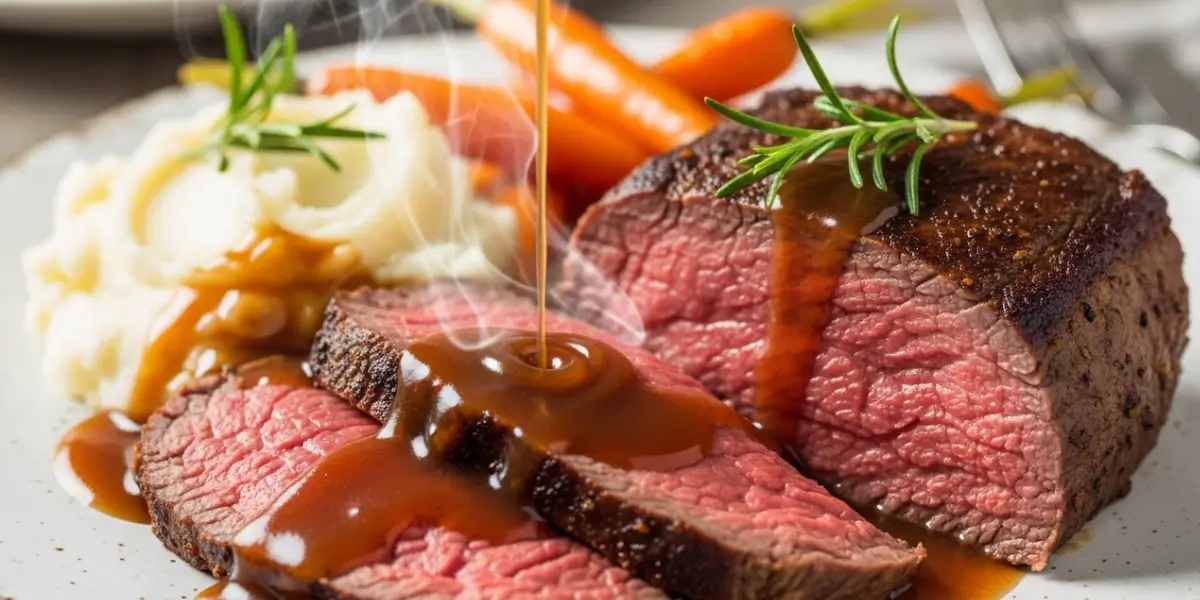
Picture this: it’s Sunday afternoon, and the aroma of perfectly seasoned roast beef with gravy fills your kitchen, bringing your family together around the dinner table. There’s something magical about slicing into a tender, juicy roast beef, watching the rich gravy cascade over each slice. If you’ve ever wondered how to create this timeless comfort food that turns ordinary meals into cherished memories, you’re in the right place. Whether you’re preparing your first roast or perfecting your technique, mastering roast beef with gravy will elevate your cooking game and make you the hero of every family gathering.
Choosing the Perfect Cut for Your Roast Beef with Gravy
The foundation of exceptional roast beef with gravy starts with selecting the right cut of meat. Your choice will determine the texture, flavor, and overall success of your dish.
Premium Cuts for Special Occasions
Roast Beef with Gravy
Recipe Information
Ingredients
- 2 lbs beef roast (rump or sirloin tip)
- 2 tablespoons olive oil
- 1 large onion, chopped
- 3 cloves garlic, minced
- 4 cups beef broth
- 1/4 cup all-purpose flour
- 2 tablespoons Worcestershire sauce
- 1 teaspoon dried thyme
- Salt and pepper to taste
- 2 tablespoons butter
Instructions
- Preheat oven to 325°F (165°C).
- Season the beef roast generously with salt and pepper on all sides.
- Heat olive oil in a large oven-safe pot or Dutch oven over medium-high heat.
- Sear the roast on all sides until browned, about 3-4 minutes per side.
- Remove the roast and set aside. Add onions to the pot and cook until softened, about 5 minutes.
- Add garlic and cook for 1 minute until fragrant.
- Return the roast to the pot and add beef broth and Worcestershire sauce.
- Cover and transfer to the preheated oven. Cook for 1.5 to 2 hours, or until the meat is tender.
- Remove the roast from the pot and let it rest on a cutting board.
- To make the gravy, melt butter in the pot over medium heat. Whisk in flour and cook for 1 minute.
- Slowly whisk in the cooking liquid from the pot until smooth. Simmer until thickened.
- Slice the roast beef and serve with the gravy.
Editorial Review
- Tender, flavorful meat with rich gravy
- Classic comfort food that appeals to all ages
- Excellent for special occasions and Sunday dinners
- Leftovers make great sandwiches
- Requires long cooking time
- Can be expensive depending on cut of beef
- Not suitable for vegetarians
When you want to impress guests or celebrate a special milestone, premium cuts deliver unmatched tenderness and flavor. Ribeye roast, also known as prime rib, features beautiful marbling that creates a buttery texture and rich taste. The standing rib roast makes a stunning centerpiece, while the tenderloin offers the most tender eating experience, though it comes with a higher price tag. These cuts naturally produce flavorful drippings that form the base of your roast beef with gravy.
Budget-Friendly Options That Deliver
You don’t need to break the bank to enjoy delicious roast beef with gravy. Chuck roast provides excellent flavor when cooked low and slow, breaking down connective tissue into melt-in-your-mouth tenderness. Top round roast offers a leaner option that works beautifully when properly seasoned and not overcooked. Bottom round roast responds well to braising methods and creates wonderful pan drippings for gravy. These economical cuts prove that outstanding roast beef with gravy is accessible to every home cook.
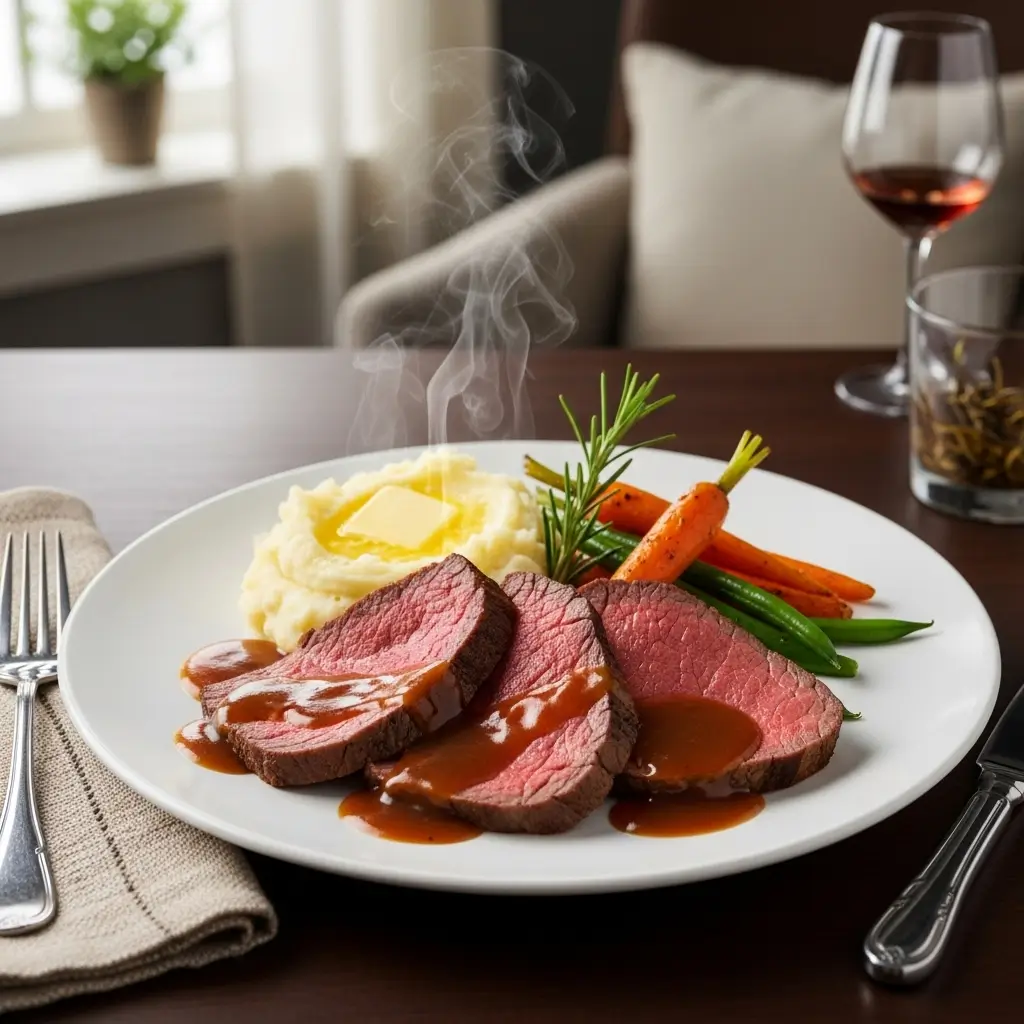
Understanding Marbling and Quality Grades
The white streaks of fat running through beef, known as marbling, directly impact your roast’s juiciness and flavor. USDA Prime grade features abundant marbling and produces the most luxurious roast beef with gravy. Choice grade offers good marbling at a more reasonable price point, making it the sweet spot for most home cooks. Select grade contains less marbling but can still produce satisfying results with careful cooking techniques and proper gravy preparation.
Mastering the Art of Cooking Roast Beef with Gravy
Cooking methods dramatically influence the final texture and flavor of your roast beef with gravy. Understanding different techniques empowers you to choose the best approach for your schedule and desired results.
Traditional Oven Roasting Method
Oven roasting remains the most popular method for preparing roast beef with gravy. Start by bringing your roast to room temperature for even cooking throughout. Sear all sides in a hot pan to develop a flavorful crust, then transfer to a preheated oven. Use a meat thermometer to monitor internal temperature—this tool is your best friend for perfect doneness. The high-heat method (450°F for 15 minutes, then 325°F) creates a beautiful exterior while keeping the interior juicy, and the pan drippings become liquid gold for your roast beef with gravy.
Slow Cooker Magic for Tender Results
Your slow cooker can transform tougher cuts into incredibly tender roast beef with gravy while you go about your day. Brown the roast first to develop complex flavors, then nestle it into your slow cooker with aromatics and liquid. Cooking on low for 8-10 hours or high for 4-6 hours breaks down collagen into gelatin, creating fork-tender meat. The accumulated juices need minimal thickening to become rich gravy, making this method perfect for busy weekdays.
Reverse Sear Technique for Precision
The reverse sear method has revolutionized how professional chefs and home cooks approach roast beef with gravy. Cook your roast at a low temperature (250°F) until it reaches 10-15 degrees below your target temperature. Remove it from the oven, let it rest, then sear it in a blazing-hot pan or under the broiler. This technique ensures edge-to-edge perfectly cooked meat with a stunning crust and generates concentrated drippings for exceptional gravy.
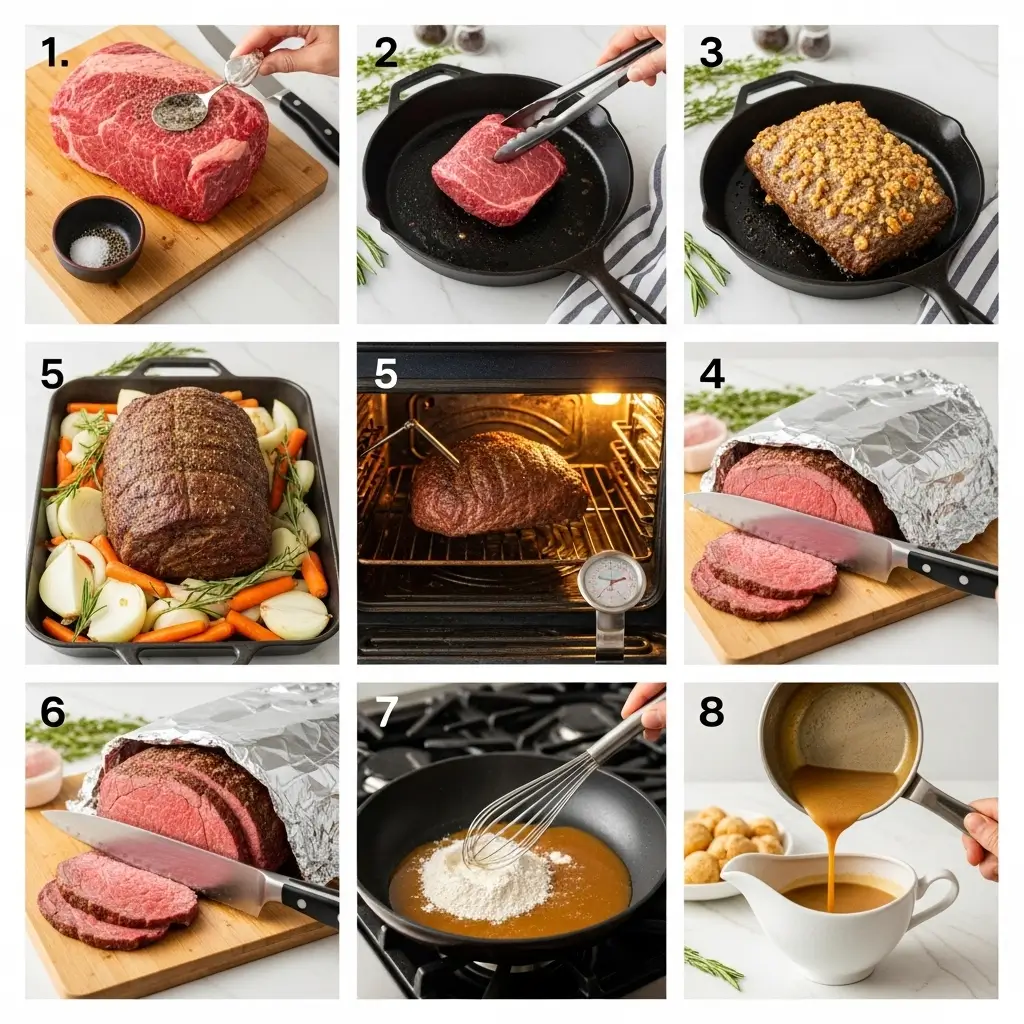
Creating Restaurant-Quality Gravy from Scratch
The gravy can make or break your roast beef with gravy experience. Learning to craft smooth, flavorful gravy from pan drippings elevates your dish from good to unforgettable.
Essential Gravy-Making Techniques
After removing your roast to rest, pour the pan drippings into a fat separator or measuring cup. Skim off excess fat, reserving 3-4 tablespoons for making your roux. Return the reserved fat to the roasting pan over medium heat, then whisk in an equal amount of flour to create a roux. Cook this mixture for 2-3 minutes to eliminate the raw flour taste. Gradually add beef stock while whisking constantly to prevent lumps from forming in your roast beef with gravy.
Flavor-Boosting Additions
Transform basic gravy into something extraordinary by incorporating flavor-enhancing ingredients. Red wine adds depth and complexity—deglaze your pan with it before adding stock. Fresh herbs like thyme, rosemary, and bay leaves infuse aromatic notes throughout your gravy. A splash of Worcestershire sauce provides umami richness, while a pat of butter whisked in at the end creates luxurious silkiness. These simple additions distinguish homemade roast beef with gravy from ordinary versions.
Troubleshooting Common Gravy Problems
Even experienced cooks occasionally encounter gravy challenges. If your gravy is too thin, make a slurry by mixing equal parts cornstarch and cold water, then whisk it into the simmering gravy. For lumpy gravy, strain it through a fine-mesh sieve or blend it with an immersion blender. Overly salty gravy benefits from adding unsalted stock or a peeled potato that absorbs excess salt. These fixes ensure your roast beef with gravy always meets your standards.
Serving and Pairing Your Roast Beef with Gravy
Presentation and accompaniments complete the roast beef with gravy experience, transforming a simple meal into a memorable feast.
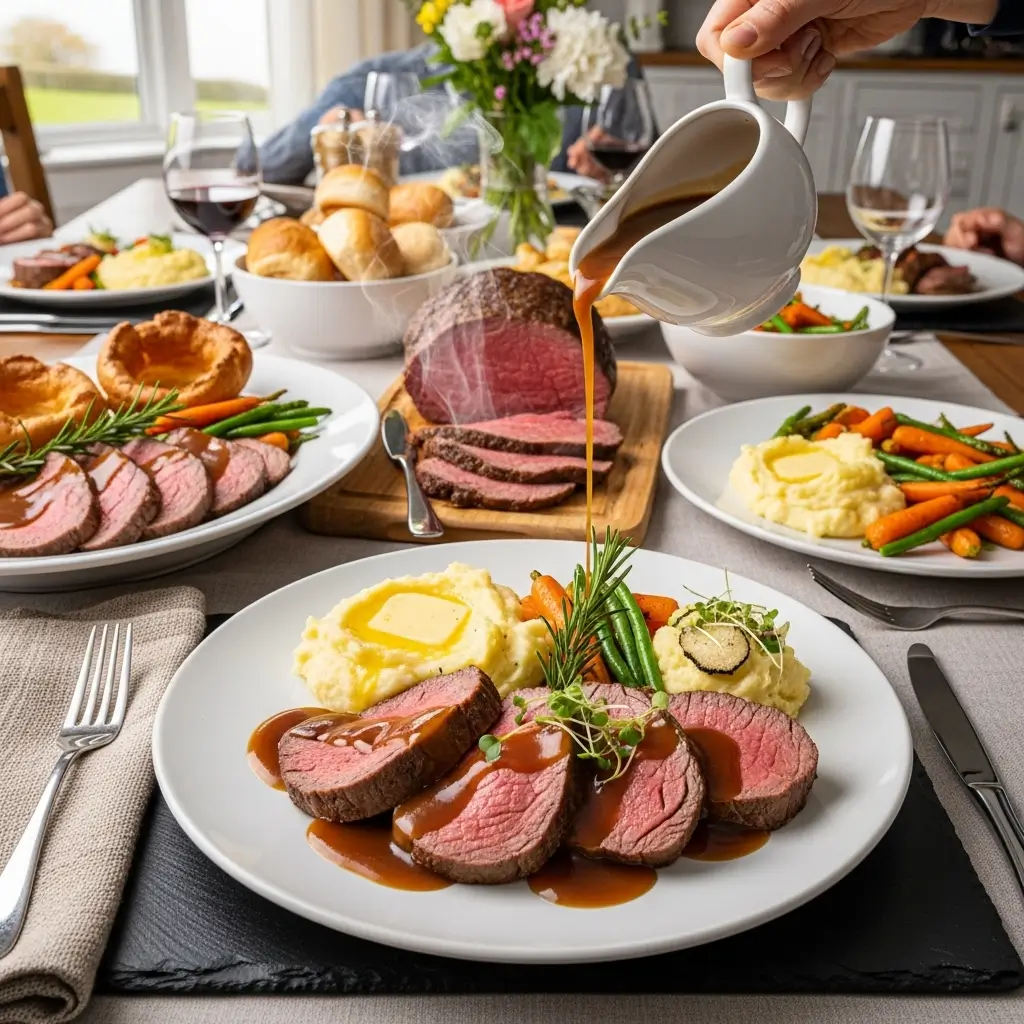
Classic Side Dish Combinations
Traditional pairings have stood the test of time for good reason. Creamy mashed potatoes provide the perfect vehicle for soaking up rich gravy. Roasted root vegetables carrots, parsnips, and turnips offer sweet earthiness that complements the savory beef. Yorkshire pudding, a British classic, creates crispy cups that capture pools of gravy. Green beans or Brussels sprouts add color and freshness to balance the richness of roast beef with gravy.
Presentation Tips for Maximum Impact
How you serve your roast beef with gravy affects the dining experience. Let your roast rest for 15-20 minutes before slicing to retain precious juices. Slice against the grain in ¼-inch to ½-inch thickness for optimal tenderness. Arrange slices on a warmed platter, slightly overlapping them for visual appeal. Pour gravy into a heated gravy boat, allowing guests to serve themselves. Garnish the platter with fresh herb sprigs for a restaurant-worthy presentation.
Storage and Leftover Magic
Properly stored roast beef with gravy provides delicious meals for days. Refrigerate leftover beef and gravy separately in airtight containers within two hours of cooking. The beef keeps for 3-4 days, while gravy lasts up to 2 days. Reheat beef slices gently in gravy to prevent drying out. Transform leftovers into French dip sandwiches, beef stroganoff, or shepherd’s pie. Freeze portions for up to 3 months, ensuring you always have the makings of a quick, satisfying meal.
Ingredients
Ingredients
- Beef roast (ribeye or chuck) – 4–5 lbs – Main protein
- Olive oil – 2 tbsp – For searing
- Kosher salt – 2 tbsp – Seasoning
- Black pepper – 1 tbsp – Seasoning
- Garlic cloves, minced – 4–5 – Flavor
- Fresh rosemary – 3 sprigs – Aromatics
- Fresh thyme – 4 sprigs – Aromatics
- Onion, quartered – 1 large – Flavor base
- Carrots, chopped – 2 large – Flavor base
- Beef stock – 4 cups – Gravy liquid
- All-purpose flour – ¼ cup – Gravy thickener
- Red wine – ½ cup – Depth of flavor
- Worcestershire sauce – 2 tbsp – Umami boost
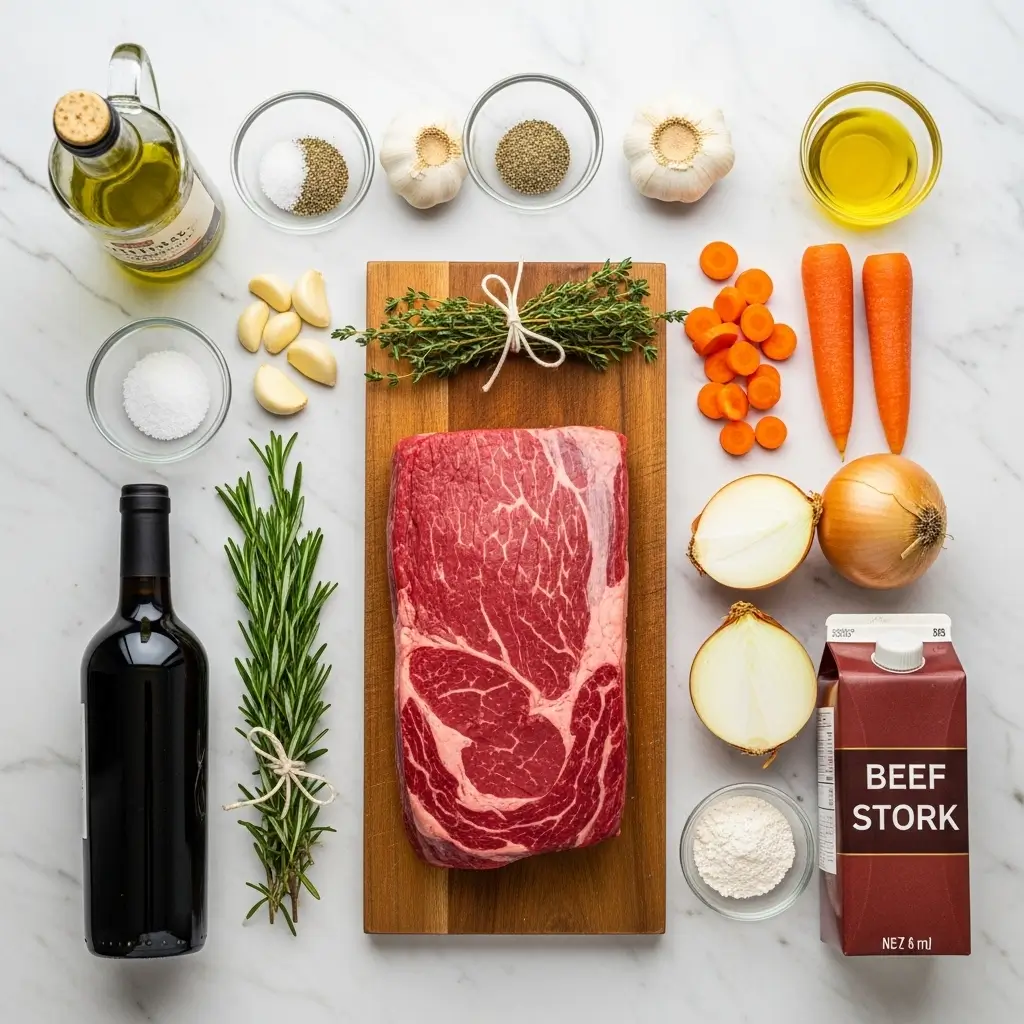
Frequently Asked Questions About Roast Beef with Gravy
How do I make roast beef with gravy that’s not dry?
The secret to juicy roast beef with gravy lies in three key factors: don’t overcook your meat, always use a meat thermometer to monitor internal temperature, and let your roast rest for at least 15-20 minutes before slicing. During resting, the juices redistribute throughout the meat rather than running out when you cut into it. Additionally, slice against the grain to shorten muscle fibers, making each bite more tender. For extra insurance against dryness, serve immediately with plenty of hot gravy spooned over the slices.
What’s the best temperature to cook roast beef with gravy?
For most roasts, 325°F provides the ideal balance between cooking time and tenderness when preparing roast beef with gravy. This moderate temperature allows the exterior to develop color while the interior cooks evenly. For premium cuts like tenderloin or ribeye, you can start at 450°F for 15 minutes to develop a crust, then reduce to 325°F. For tougher cuts like chuck roast, lower temperatures (275°F) over longer periods break down connective tissue more effectively. Always prioritize internal temperature over cooking time aim for 130-135°F for medium-rare, 135-145°F for medium.
How long does roast beef with gravy last in the refrigerator?
Properly stored roast beef with gravy remains safe and delicious for 3-4 days in the refrigerator. Store the beef and gravy in separate airtight containers to maintain optimal texture and prevent the meat from becoming soggy. Always refrigerate within two hours of cooking to prevent bacterial growth. When reheating, warm beef slices gently in gravy over low heat or in the microwave at 50% power to avoid drying out the meat. If you notice any off-odors or sliminess, discard the leftovers immediately.
What can I do if my roast beef with gravy turned out tough?
If your roast beef with gravy ended up tougher than expected, don’t despair you have options. Slice the beef as thinly as possible against the grain to minimize chewiness. Simmer the slices in hot gravy for 15-20 minutes to soften the meat fibers. Alternatively, shred or chop the tough beef and use it in dishes where texture is less critical, such as beef stew, tacos, hash, or pot pie. For future roasts, consider using a marinade with acidic ingredients like vinegar or wine to help tenderize tougher cuts before cooking.
Conclusion: Your Path to Perfect Roast Beef with Gravy
Mastering roast beef with gravy transforms you into a confident home chef capable of creating restaurant-quality meals that bring people together. From selecting the perfect cut and choosing your cooking method to crafting velvety gravy and presenting a stunning table, every step contributes to the final masterpiece. Remember that practice makes perfect each roast beef with gravy you prepare teaches you something new about timing, temperature, and flavor development.
The beauty of roast beef with gravy lies not just in its delicious taste but in the memories you create while sharing it with loved ones. Whether you’re hosting a formal dinner party, preparing a cozy family meal, or celebrating a special occasion, this classic dish never disappoints. The techniques you’ve learned here will serve you for years to come, evolving as you add your personal touches and family traditions.
Don’t wait for a special occasion to try your hand at roast beef with gravy. Start this weekend by selecting a beautiful cut of beef, gathering your ingredients, and following the techniques outlined in this guide. Your kitchen will fill with mouthwatering aromas, and your table will become a gathering place for grateful family and friends. Share your roast beef with gravy success stories in the comments below, and don’t forget to bookmark this guide for your next Sunday dinner!
Roast Beef with Gravy
A classic comfort dish perfect for family dinners

